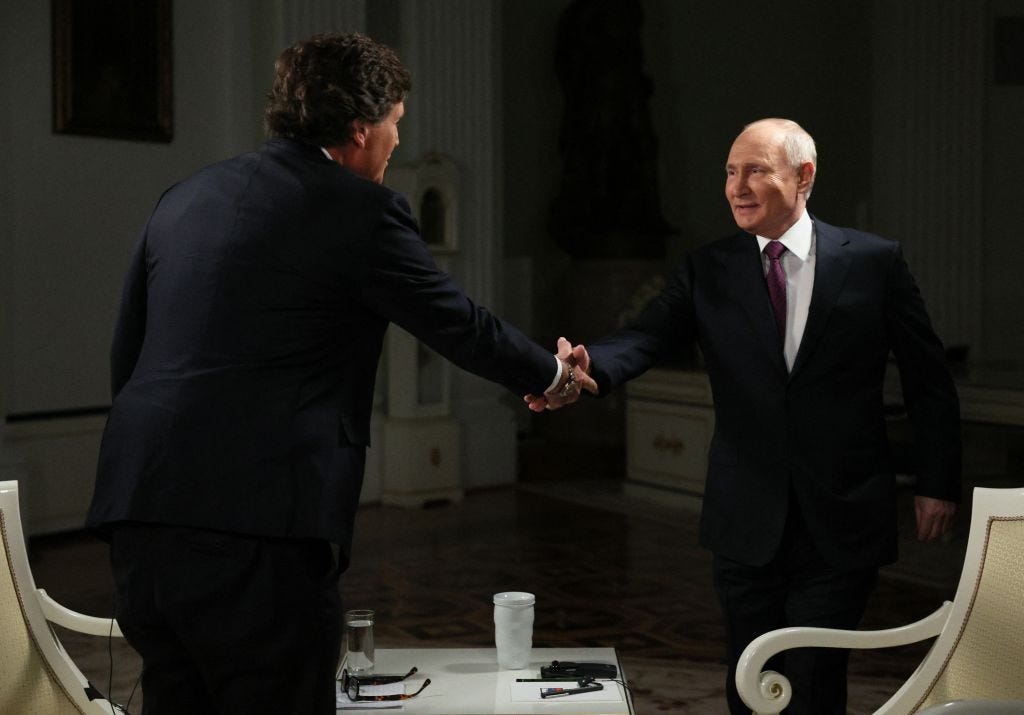- Vladimir Putin's interview with Tucker Carlson showcased his delusions, two Russia experts said.
- Putin attempted to negate Ukraine's sovereignty through his version of Russian history.
- US senators are working to provide aid to Ukraine and Israel, but it may not survive the House.
Russian President Vladimir Putin delivered a strange performance fueled by Russian propaganda and imperialist posturing in his interview with right-wing media host Tucker Carlson last week.
The two-hour interview revealed little new information about the war in Ukraine — beyond that it is likely to continue — but did manage to highlight Putin's increasing delusion, according to two Russia historians.
"Putin's performance was strange," said Robert English, a professor at the University of Southern California who studies Russia, the Soviet Union, and Eastern Europe.
For nearly 30 uninterrupted minutes, Putin rattled off his version of Russian history in an apparent attempt to prove that Ukraine is not a sovereign country. Countless historians and analysts have refuted Putin's sovereignty claims since the war began in February 2022.
The Russian president parroted in great, slogging detail many of the erroneous talking points he's used over the years to bolster his belief that Ukraine ought to be under Russian control.
"Putin seems like a delusional man who has lost touch with reality, yammering on about Rurik and the Polish-Lithuanian Commonwealth," said Simon Miles, an assistant professor at Duke University's Sanford School of Public Policy and a historian of the Soviet Union and US-Soviet relations.
"The first question where Carlson asks about outbreak of hostilities in Ukraine — as if they just spontaneously combusted and Putin didn't invade, starting the war — really set the tone," Miles wrote in an email to BI.
The interview, which streamed Thursday on Carlson's website and X, comes at a key moment in Ukraine's fight for ongoing US assistance.
Putin could have easily blamed the invasion on Russia's fear of an expanding NATO presence in the region, English said. If Putin had acquiesced even a bit — hinting at the possibility of eventual reconciliation — he may have been able to turn the tide even further against continued US assistance to Ukraine.
"Instead, he showed that it wasn't Russian insecurity, but Putin's personal imperialism, that motivated the war," English said. "And so those watching in the West may well conclude that he still wants to conquer all of Ukraine, that he will never respect its sovereignty, and so the West must keep the weapons flowing to Kyiv."
"He could have shown that he is reasonable and open to a fair compromise," English added. "Instead, he showed that he is both imperious as well as imperialistic, and so compromise with him may be impossible."
In their read of the interview, the New Yorker's Masha Gessen noted the danger of Putin's delusion.
"But the way Putin described the beginning of the Second World War in his interview with Carlson suggests that, although he keeps accusing Ukraine of fostering Nazism, in his mind, he might see himself as Hitler, but perhaps a wilier one, one who can make inroads into the United States and create an alliance with its presumed future President," Gessen wrote.
Former President Donald Trump made comments over the weekend that added to the potential dangers of Putin's view. The GOP frontrunner said the US should allow Russia to attack non-paying NATO countries and even "encourage them to do whatever the hell they want."
Meanwhile, US senators are working to advance a bill that would provide aid to Ukraine and Israel, but its prospects in the House remain uncertain.
